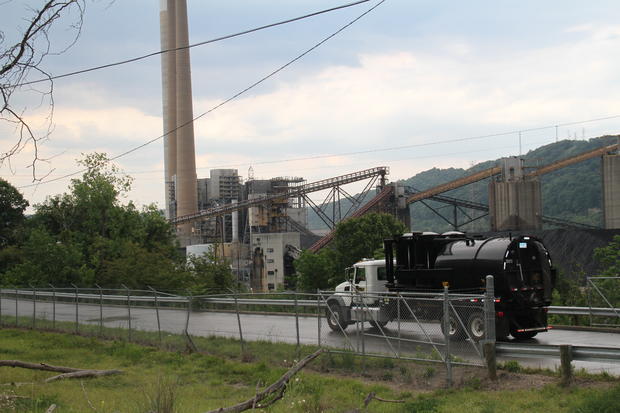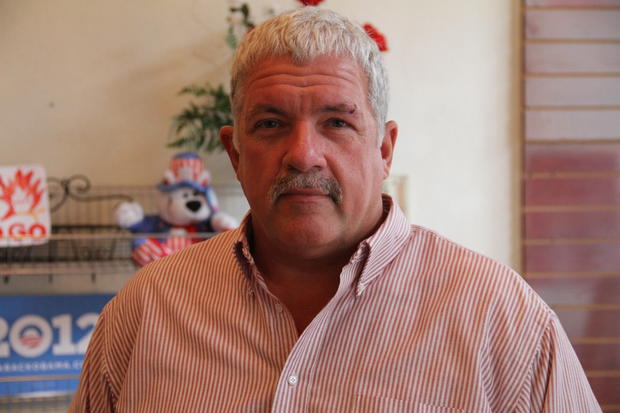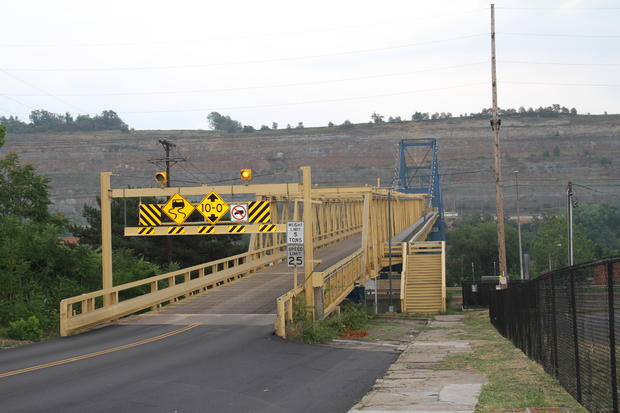Has Obama declared a "war on coal?"
(CBS News) STEUBENVILLE, Ohio - Can Mitt Romney win Ohio by convincing voters in this economically-depressed Appalachian town and those like it that President Obama has declared a "war on coal?"
That's the message coming from Romney's Ohio campaign manager, Scott Jennings, who argued in an interview that Mr. Obama's "hostility to domestic oil production" - particularly when it comes to coal - will help put Romney over the top in this pivotal swing state. Mr. Obama is holding a campaign event in Cincinnati on Monday.
Jennings pointed to the fact that six coal-burning power plants in Ohio - three in or around Cleveland and one each near Toledo, Dayton and Cincinnati - are slated to close or have closed, taking hundreds of jobs and much-needed tax revenue with them. Republicans and many in the coal industry attribute the closures in large part to Environmental Protection Agency regulations mandating reduced mercury and other emissions. Jennings said the losses will resonate across a state where the Ohio Coal Association, citing unnamed studies, says there are up to 11 "spin-off" jobs tied to each of the more than 3,000 jobs in the state in the coal industry.
"The energy policies don't just affect a guy that's a coal miner," he said.
The notion that Mr. Obama has declared "war on coal," as his detractors put it, could have ramifications beyond Ohio. Anger toward the Obama administration is boiling over in coal mining areas of West Virginia like Mingo County, where some residents blame the president for mine and plant closures and lost jobs - an apparent factor in the strong showing by a convicted felonagainst the president in the Democratic primary early this year. (Democratic West Virginia Sen. Joe Manchin has aggressively distanced himself from the president and his policies on coal.) And while Mr. Obama has little chance of taking West Virginia regardless of his position on coal, the industry is also significant in nearby Pennsylvania, where the president holds a single-digit lead in recent polls, as well as the crucial swing state of Virginia.
Republicans are doing their best to raise the issue in the public consciousness: The GOP-led House Natural Resources Committee last week asked Obama administration officials, including Interior Secretary Ken Salazar, to testify over a proposal to protect streams from coal mining that the administration acknowledges would cost thousands of coal jobs. The Romney campaign, meanwhile, says Mr. Obama has shown "disdain" for the coal industry and the jobs it creates.
Democrats in Ohio, citing Mine Safety and Health Administration figures, counter that coal jobs in the state have actually increased 10 percent under Mr. Obama. "In Ohio today, there are more people working in coal than the day the president took office," said Chris Redfern, Chairman of the Ohio Democratic Party. Redfern added that the coal-burning power plants being closed would have been shut down soon without the EPA regulations because of their age.
Inside the Obama campaign office in Steubenville, Ed Good, an Obama supporter and utility worker who works at Sammis Coal Plant in Stratton, Ohio, complained of Republican "misrepresentations" on Mr. Obama's record on coal.
"We see these signs all the time without disclaimers, we see this perception that there's a war on coal, it's simply not true," he said. "There's more mining jobs right now than there has been in the last 14 years."
Yet the notion that Mr. Obama favors environmental concerns at the expense of much-needed jobs resonates in this southeast Ohio region, which has not found an economic lifeline in the wake of the collapse of the U.S. steel industry 30 years ago. The Rust Belt shift toward natural gas production, driven by new technology that allows for extraction through "fracking," has thus far generated few jobs in the region.
"If you're looking regionally, these folks understand how bad this administration has been to the American coal industry," said Mike Carey, chairman of the Ohio Coal Association. "But I also think that once people start having to spend more for electricity - which they will - there's nobody to blame except for the administration." He said that domestic coal production has fallen from 1.2 billion tons per year when Mr. Obama took office to 808 million tons per year today.
"If you look at the rhetoric and the policy from the president and his staff, clearly we see a direction," Carey said. "You don't look at those numbers and think that he's improved the lot of the coal miner's life."
He added: "From a regional perspective, it's an all-out war."
The United Mine Workers of America, which represents 600 active coal miners in Ohio and 90,000 active and retired coal industry workers nationwide, has thus far not endorsed Mr. Obama's reelection despite backing him in 2008.
The Obama administration has sought to reduce carbon emissions in an effort to combat climate change, in part through investment in clean energy alternatives like solar power. But the president has not issued rules limiting greenhouse gas emissions for power plants - a move that would likely cause him serious political headaches in Rust Belt states. His effort to pass so-called "cap-and-trade" legislation - which would reduce carbon pollution by imposing caps on emissions and allowing companies to buy and sell pollution permits - collapsed in 2010 and has been little-mentioned by the president since.
Romney has opposed greater regulation on coal production during the campaign, saying the industry needs to be free to help "power America's economy." He has said that carbon emissions should not be subject to regulation under the Clean Air Act. Mr. Obama's EPA has been fending off lawsuits backed by coal and other energy interests challenging its authority to regulate carbon as a pollutant.
Romney's record as Massachusetts governor, however, suggests far more openness to regulation. In 2005, Romney lauded the state's establishment of carbon emission limits that he said "will provide real and immediate progress in the battle to improve our environment." Early in his term, Romney hired a prominent environmental activist who stood by his side as he stood outside a coal-fired plant and explained, "I will not create jobs or hold jobs that kill people, and that plant, that plant kills people." Romney also at one point backed a regional cap-and-trade system as governor, though he later backed off that position.
The EPA regulations approved under Mr. Obama are designed to reduce emissions of mercury and other pollution by 90 percent by requiring plant owners to install mechanisms to control the pollution. While many newer plants were already largely in compliance with the requirements, many older plants were not, and owners were forced to either install the costly technology to reduce toxic emissions or move toward a shut down.
The rules "will protect millions of families and children from harmful and costly air pollution and provide the American people with health benefits that far outweigh the costs of compliance," EPA Administrator Lisa P. Jackson said when they were finalized in December 2011.The EPA estimates the regulations, which will cost an estimated $9.6 billion, will prevent up to 11,000 early deaths each year and save billions in health care costs.
Mr. Obama's website calls for an "all of the above" energy policy that includes an investment in "clean coal" technology - that is, more efficient and less costly technology to reduce emissions. "President Obama has set a 10-year goal to develop and deploy cost-effective clean coal technology," the site says. "The Recovery Act invested substantially in carbon capture and sequestration research, including 22 projects across four different areas of carbon capture-and-storage research and development."
Forty-five percent of the electricity consumed in the United States is generated by coal, according to the U.S. Energy Information Administration.


